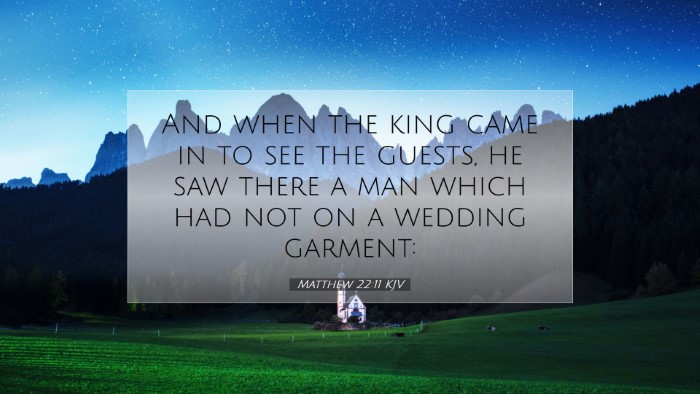Commentary on Matthew 22:11
Matthew 22:11 states: "But when the king came in to see the guests, he noticed a man there who was not wearing wedding clothes." This verse is situated within the parable of the wedding feast, which provides rich theological and practical insights.
Contextual Overview
This parable, elaborated by Jesus, illustrates the nature of God's kingdom and the responses of those invited to it. In the cultural backdrop of Jesus' time, the practice of inviting guests to a feast, particularly a royal one, mandated certain decorum, including appropriate attire. Failure to comply with such an expectation spoke volumes about dishonor and disrespect toward the host.
Commentary Insights
Matthew Henry
Matthew Henry emphasizes that this verse illustrates the importance of proper preparation for the kingdom of heaven. The man without a wedding garment symbolizes those who attempt to enter God's kingdom on their own terms without the righteousness required by God. Henry posits that the righteousness we need is not of our own making but is a gift of grace, reflecting the teaching that faith must be accompanied by a true transformation of character.
Albert Barnes
Albert Barnes focuses on the significance of the wedding garments, interpreting them as righteousness or the character required for entering heaven. He notes that the absence of a wedding garment signifies the neglect of one's spiritual obligation to be attired properly in virtues befitting a citizen of the kingdom. Barnes suggests that Jesus uses this imagery to remind believers that they must not only accept the invitation to God's feast but also ensure that they are adequately prepared, reflecting a life consistent with their profession of faith.
Adam Clarke
Adam Clarke offers insights into the symbolism of the wedding garment within First Century Jewish customs. He posits that the host typically provided garments for guests who lacked appropriate attire, symbolizing God's provision for those He invites. Clarke underscores that the man's refusal to wear the garment symbolizes an outright rejection of God's gracious provision. This speaks to the idea that all who enter the kingdom must have a divine righteousness that comes through Christ, making their presence acceptable.
Theological Implications
This verse transitions from mere narrative to deep theological significance, prompting us to consider the implications of our spiritual preparedness. The rejection faced by the man without a wedding garment conveys that mere invitation to the kingdom is insufficient; it requires a responsive, active faith that manifests itself in a life reflecting Christ's righteousness.
- Significance of Righteousness: The necessity of a 'wedding garment' symbolizes that entering the kingdom of God requires personal righteousness. This righteousness is attributed to Christ and to us as we receive Him by faith.
- Cultural Context: Understanding the cultural significance of wedding garments highlights God's expectations for us to embody the principles of His kingdom in our everyday lives.
- Call to Accountability: The man’s lack of proper attire indicates a lack of accountability for one's spiritual state. Engaging with God’s invitation necessitates preparation and transformation.
Practical Applications
For pastors, theologians, and students of the Word, this passage carries practical applications that extend beyond personal righteousness. It encourages exploration of how believers can live out their faith while engaging in the wider community. Consider the following:
- Examine Spiritual Readiness: Believers should continually examine their lives to ensure they align with the calling they have accepted. This involves introspection and a desire for holiness.
- Lead by Example: Spiritual leaders must guide their congregations in understanding that the call to Christ requires a life attired in the values and practices of the kingdom.
- Promote Grace and Accountability: While grace is freely given, it should lead to transformative accountability exhibited in the life and actions of believers.
Conclusion
Matthew 22:11 acts as a stern reminder of the necessity of preparedness in God's kingdom. The absence of the proper wedding garment symbolizes deeper truths about spiritual readiness, grace, and accountability. The teachings drawn from public domain commentaries, particularly those of Henry, Barnes, and Clarke, help illuminate our understanding of this vital parable, urging us as individuals and leaders to approach our Christian life with diligence, faith, and reverence.


